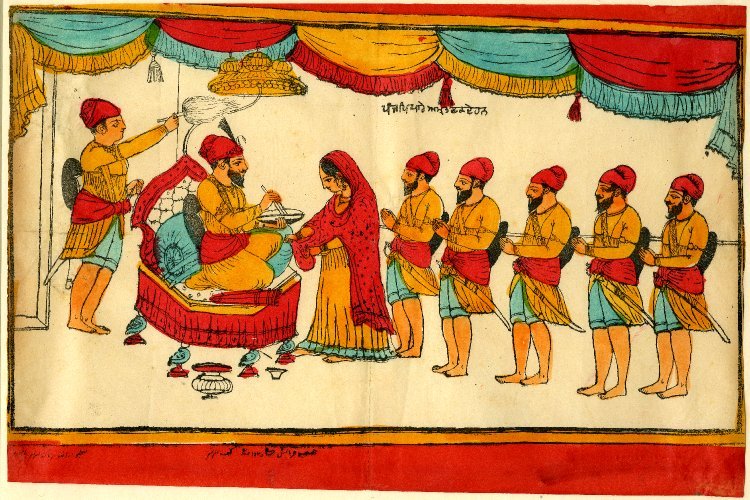This article is based on excerpts from the 'Spirit of the Sikh' written by Professor Puran Singh in 1920's and published by Punjabi University Patiala in two volumes during 1982. This is Part I of V.
Puran Singh was a great scientist, mystic poet, and a visionary and interpreter of the Sikh cultural consciousness. This article reflects the personal views of the great Sikh scholar which seem to be relevant for understanding Sikhism and the geopolitical aspirations of the Sikhs.
1. The Sikh Gurus
As usual, the world is too inert, too late, to welcome its prophets who bring an altogether new message. So it has been with the Sikh Gurus. The Hindus just condescended with a superior air to say that the Sikhs are of them- 'born out of them'. Culturally and academically and even racially this was not wrong, but inspirationally, it was an attempt to thwart all the potentialities of the Guru's universal message.
After Buddha, it was Guru Nanak who for the first time championed the cause of the masses in caste-ridden India. The rich aristocracy and the degraded priests of Hindus and Muslims did not listen to the Guru, but the oppressed people followed him with joy. He made a whole people throb with love and life. For more than a century and half his message was secretly flaming in the bosom of the people when the genius of Guru Gobind Singh gave them the eternal shape of the Disciples, the Khalsa [1].
Guru Gobind Singh is the Guru of the modern times. Assuredly, the slaves of India have not understood him so far and are not capable of understanding his genius. The shadow of his large personality falls far away above the head of centuries, and the so-called best intellectuals of India, when they spread out their mind to understand the Guru, get bruised by mere thorns and give him up as something not as spiritual as Guru Nanak. If they cannot see Guru Gobind Singh as the highest, brightest culmination of Guru Nanak, assuredly they do not understand that King of revolution of religious thought, the great Guru Nanak.
The world of thought has yet to understand the Ten Gurus in the splendour of their thought which has been misunderstood due to the Brahmanical language they had to employ to express themselves and to the Brahmanical environment which always has been inimical to the true progress of man [2].
Guru Granth of the Sikhs is the most authentic account of the Guru's soul. It is a pity that some Sikh enthusiasts and half-baked scholars, perverted by the thought of the age, have tampered with the meanings they themselves wish to give it. But the authentic word of Guru Granth can never be lost to the world. And as the Bible is translated into different languages, so Guru Granth will have to be put by poets of different nations into their own language direct from their own souls. Life alone can translate life [3].
The Guru Granth is the history of the Sikh soul, and its translation is to come through the great figure of the social reconstruction of human society as the Khalsa, where shall reign love, and not hatred. It is society founded on the highest verity of love of man, inspired by the inspiration of God-like men who symbolize truth as personalities of love, grace and mercy, such personalities are images of the personalities in the unseen. Giving ourselves in infinite self-sacrifice in the name of God, washing away the selfishness of man in the supreme love of the Guru, is the simple, but extremely difficult path of discipleship. Without the Word of the Guru, and the ideal, the Khalsa, which stands for the sovereign society, there is no key to the heart of Guru Nanak and his anthems for the liberation of man. The destruction by the Guru of the Brahmanical citadels of superstition (as in Guru Nanak's Asa-Ki-Var or in the great Kabits and Sawayyas of the Tenth Master, Guru Gobind Singh, or in the Vars of Bhai Gurdas, the great exponent of Sikh ideals), is symbolic of the destruction of all lies on which human society might be wrongly founded and misguided. Guru Nanak is universal, but he is mostly the Prophet of the future. Freedom of the human mind and soul is the Guru's passion [4].
The Guru did not eschew politics-in fact he made the liberation of the people the cause of the assertion of his heroism; but surely, if the Sikh lives on the surface only, like the Englishman, for mere politics, votes and such inanities, one straying from the Guru's path forthwith becomes a traitor to his cause. All freedom is but a spiritual tradition of the life of the Khalsa: if the Khalsa spirit is dead, all freedom fails. The Khalsa is the son of the Guru who brings everywhere his Heaven and its delectable freedoms [5].
The following words were addressed by Guru Gobind Singh to the Sikhs at Nander on the day of his departure from this world: "I have entrusted you to the Immortal God. Ever remain under His protection, and trust none besides. Wherever there are five Sikhs assembled who abide by the Guru's teachings, know, that I am in the midst of them. He who serveth them shall obtain the reward thereof-the fulfillment of all his heart's desires".
"Read the history of your Gurus from the time of Guru Nanak. Henceforth the Guru shall be the Khalsa and the Khalsa the Guru. I have infused my mental and bodily spirit into the Granth Sahib and the Khalsa.
Then uttering "Wah Guruji Ka Khalsa, Wah Guruji Ki Fateh" he circumambulated the sacred volume and said, "O Beloved Khalsa, let him who desireth to behold me, behold the Granth Sahib. Obey the Granth Sahib. It is the visible body of the Guru, and let him who desireth to meet me diligently search its hymns. And lastly keep my kitchen ever open and receive offerings for its maintenance".
Prof. Hardev Singh Virk
Department of Physics, Guru Nanak Dev University
Amritsar - 143005, India.
E-mail: [email protected]
-----------------------------------------
References:
1. Singh, Puran 1982. Spirit of the Sikh, Vol. II, Punjabi University Press, Patiala, India. p.317.
2. Singh, Puran 1976. The Spirit Born People, Punjabi University Press, Patiala, India.p. 126.
3. Singh, Puran 1982. Spirit of the Sikh, Vol. I, Punjabi University Press, Patiala,India. p. 12.
4. Ibid, p. 14.
5. Ibid, p. 54.
-------------------------------------------------------------------------------------
Related Article:






